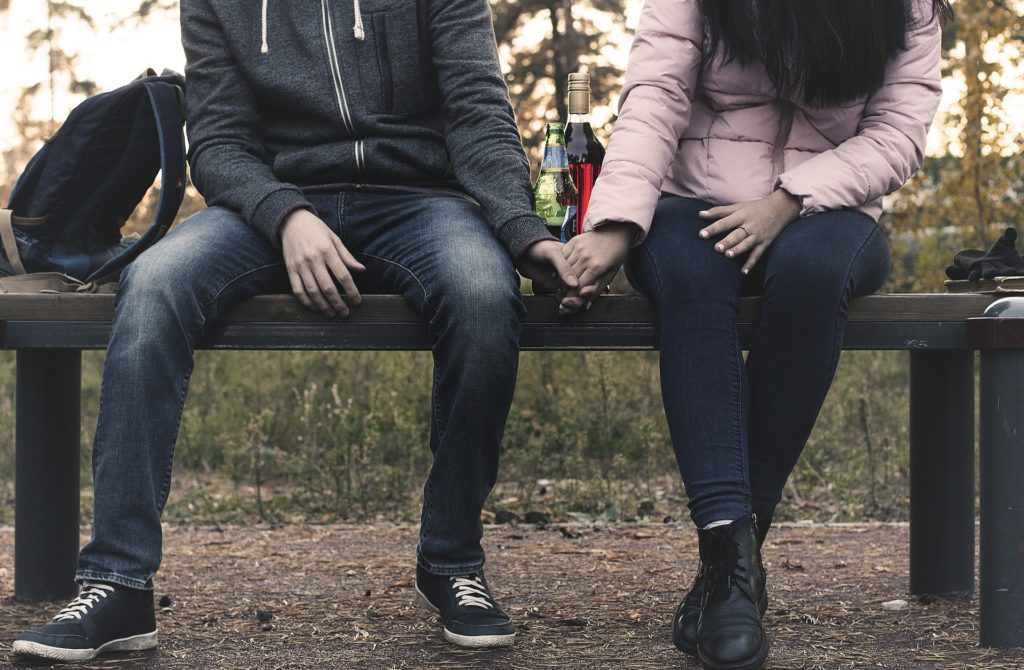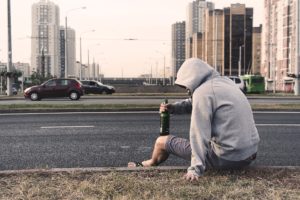
Bipolar and alcohol are often a common comorbid issue. Symptom relief in those struggling with bipolar is one reason individuals turn to substances to help ease episodes of mania, irritability, or depression.
Bipolar Defined
Bipolar is a mental health disorder that can cause sudden and irregular changes in mood, energy, and activity level [1]. It can affect a person’s day-to-day functioning and daily activities. Within the United States alone, bipolar affects over 6 million adults.
Episodes of bipolar typically consist of periods of mania and depression. Manic episodes are usually a sense of euphoria, being on top of the world, or people report feeling intensely happy and optimistic.
Often other behaviors such as shopping or buying sprees, stating house or work projects and commit to for days without sleep and intense energy levels.
Often bipolar disorder is significantly immobilizing for many. With racing, thoughts and difficulty focusing on one task at a time can leave individuals unable to finish tasks or projects.
Often within a manic episode, people will make utopian or grand plans or goals which are unachievable or outside of their ability [1].
Depressive episodes, on the other hand, are also debilitating. Individuals may sleep for 12 hours or more at a time, struggle to get out of bed and have difficulty focusing on a task.
Often people report feelings of despair, sadness, emptiness, and loneliness. Some individuals describe their bipolar depressive episode as a dark hole or pit that they are unable to get out of and cannot see the way out.
Types of Bipolar
Within Bipolar disorder, there are two types-Bipolar 1 and Bipolar II. Bipolar I is where there are significant shifts from manic to depressive states.
Manic phases can last for a week or more depending on the severity, whereas depressive phases can last up to two weeks in duration.
Episodes within Bipolar I can also be mixed with both mania and depression.
Bipolar II is typically a phase of depressive episodes mixed with manic symptoms.
It usually is not full-duration mania that those with Bipolar I experience.
Cyclothymia is another subtype which a person has long-lasting mania or depressive symptoms that do not meet the criteria for either Bipolar I or II.
Alcohol is typical within bipolar as it enhances the symptoms experienced. Alcohol depresses the central nervous system however which can increase the feelings of depression [1].
In mania, it can also reduce inhibition and create a euphoric feeling to high-risk behaviors engaged in during this phase. It can increase the risk of irresponsibility and unsafe practices.
Alcohol use is when a person engages in drinking alcohol to ‘get through the day.’ It can disrupt a person’s day-to-day activities and behaviors. Symptoms are that the person may drink longer than intended, craves or has urges to drink.
A person may try to stop or cut back on the amount of alcohol use but is unable to do so. Alcohol interferes with a person’s daily life, and they may stop engaging in activities or hobbies once enjoyed.
Research Connects the Dots
Bipolar disorder and alcohol use create change in a person’s behavior and shifts in mood. This can be a dangerous combination as alcohol reacts in the same region of the brain that many anti-depressants do, increasing the depressive symptoms and negative thinking pattern, therefore increasing suicidality [1].

In one study, those with bipolar disorder were more likely to have episodes of bipolar if they drink alcohol, regardless of how much they drink compared to those who do not [1]. The study also found a direct link between alcohol consumption and the rate of manic or depressive episodes.
There are inherited traits and genetic differences that do affect our brain chemistry, which is also connected to how our brains respond to alcohol [2]. This can increase the susceptibility to alcohol use when a mental health disorder, such as bipolar, is present.
According to a study in 2014 by the National Survey on Drug Use and Health (NSDUH) found that 43.6% of Americans 18 years and older had a substance use disorder [3]. Of those with a disorder, 7.9 million had both a mental health disorder and substance use disorder.
Engaging in treatment for both bipolar treatment and alcohol rehab is one that requires comorbid focus. Looking into treatment facilities that can simultaneously treat both disorders is recommended.
Having a safe place to withdraw or detox from the alcohol use while having supervised and medically supervised care can help with the bipolar episodes and symptoms during this time. Therapy along with group support, meal plan structuring, and learning healthy coping skills and tools to aid in symptom reduction are all keys to treatment success.
Remember that treatment can be useful and help with symptom management of both disorders. Working with your treatment team to assess the best level of care for sobriety and recovery is essential.
 About the Author: Libby Lyons is a Licensed Clinical Social Worker and Certified Eating Disorder Specialist (CEDS). Libby has been practicing in the field of eating disorders, addictions, depression, anxiety and other comorbid issues in various agencies. Libby has previously worked as a contractor for the United States Air Force Domestic Violence Program, Saint Louis University Student Health and Counseling, Saint Louis Behavioral Medicine Institute Eating Disorders Program, and has been in Private Practice.
About the Author: Libby Lyons is a Licensed Clinical Social Worker and Certified Eating Disorder Specialist (CEDS). Libby has been practicing in the field of eating disorders, addictions, depression, anxiety and other comorbid issues in various agencies. Libby has previously worked as a contractor for the United States Air Force Domestic Violence Program, Saint Louis University Student Health and Counseling, Saint Louis Behavioral Medicine Institute Eating Disorders Program, and has been in Private Practice.
Libby currently works as a counselor at Fontbonne University and is a Adjunct Professor at Saint Louis University, and is a contributing author for Addiction Hope and Eating Disorder Hope. Libby lives in the St. Louis area with her husband and two daughters. She enjoys spending time with her family, running, and watching movies.
References:
[1] Johnson, J. (n.d.). Bipolar Disorder and Alcohol: What’s the Connection? Retrieved October 01, 2017, from https://www.medicalnewstoday.com/articles/313571.php
[2] Hall-Flavin, M. D. (2016, April 06). Bipolar disorder and alcoholism: Are they related? Retrieved October 01, 2017, from http://www.mayoclinic.org/diseases-conditions/bipolar-disorder/expert-answers/bipolar-disorder/faq-20057890
[3] L. (2016, March 08). Co-occurring Disorders. Retrieved October 01, 2017, from https://www.samhsa.gov/disorders/co-occurring
The opinions and views of our guest contributors are shared to provide a broad perspective of addictions. These are not necessarily the views of Addiction Hope, but an effort to offer discussion of various issues by different concerned individuals.
We at Addiction Hope understand that addictions result from a combination of environmental and genetic factors. If you or a loved one are suffering from an addiction, please know that there is hope for you, and seek immediate professional help.
Published on November 4, 2017
Reviewed By: Jacquelyn Ekern, MS, LPC on November 4, 2017.
Published on AddictionHope.com
